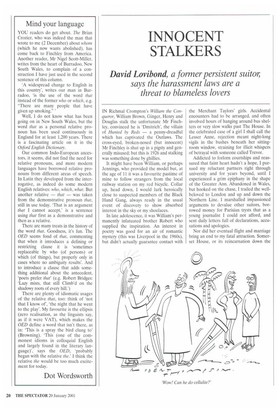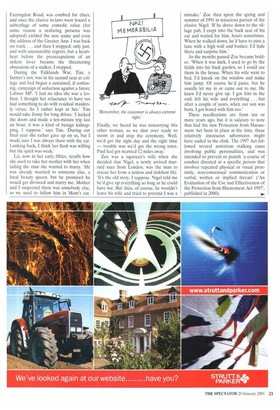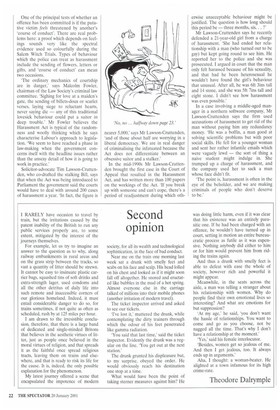INNOCENT STALKERS
David Lovibond, a former persistent suitor,
says the harassment laws are a threat to blameless lovers
IN Richmal Crompton's William the Conqueror, William Brown, Ginger, Henry and Douglas stalk the unfortunate Mr Finchley, convinced he is `Dmitrich', the villain of Hunted by Reds — a penny-dreadful which has captivated the Outlaws. The cross-eyed, broken-nosed (but innocent) Mr Finchley is shut up in a pigsty and generally misused; but this is 1926 and stalking was something done by ghillies.
It might have been William, or perhaps Jennings, who provided the model but, at the age of 11 it was a favourite pastime of mine to follow strangers from the local railway station on my red bicycle. Collar up, head down, I would lurk heroically close to suspected members of the Black Hand Gang, always ready in the usual event of discovery to show absorbed interest in the sky or my shoelaces.
In late adolescence, it was William's permanently infatuated brother Robert who supplied the inspiration. An interest in poetry was good for an air of romantic mystery (this was Liverpool in the 1960s), but didn't actually guarantee contact with the Merchant Taylors' girls. Accidental encounters had to be arranged, and often involved hours of hanging around bus shelters or very slow walks past The House. In the celebrated case of a girl I shall call the Lesser Anne, rejection meant night-long vigils in the bushes beneath her sittingroom window, straining for illicit whispers of betrayal with someone called Trevor.
Addicted to forlorn courtships and reassured that faint heart hadn't a hope. I pursued my reluctant partners right through university and for years beyond, until I experienced a grim epiphany in the shape of the Greater Ann. Abandoned in Wales, but hooked on the chase, I trailed the wellbeloved to London and up and down the Northern Line. I marshalled impassioned arguments to devalue other suitors, borrowed money for Parisian trysts that as a young journalist I could not afford, and sent daily letters full of declarations, accusations and apologies.
Nor did her eventual flight and marriage bring an end to my fatal attraction. Somerset House, or its reincarnation down the Farringdon Road, was combed for clues, and once the elusive in-laws were traced a subterfuge of some comedic value (for some reason a seafaring persona was adopted) yielded the new name and even the address of the Greater Ann. I was back on track . .. and then I stopped; only just, and with uncountable regrets, but a heartbeat before the preoccupations of an ardent lover became the threatening obsessions of a stalker, I stopped.
During the Falklands War, Tim, a farmer's son, was in his second year at college and had begun a sustained, if confusing, campaign of seduction against a future Labour MP. had no idea she was a lesbian. I thought her reluctance to have sex had something to do with residual maidenly virtue. So I rather kept at her.' Tim would take Jenny for long drives, I locked the doors and made a ten-minute trip last an hour; it was a kind of benign kidnapping, I suppose,' says Tim. 'During our final year she rather gave up on us, but I made sure I was always there with the car. Looking back, I think her flesh was willing but the spirit was weak.'
Liz. now in her early fifties, recalls how she used to take her mother with her when tailing the man she wanted to marry. 'He was already married to someone else, a local beauty queen, but he promised he would get divorced and marry me. Mother and I suspected there was somebody else, so we used to follow him in Mum's car.
Finally, we heard he was remarrying this other woman, so we shot over ready to storm in and stop the ceremony. Well, we'd got the right day and the right time — trouble was we'd got the wrong town. Paul had got married 12 miles away.'
Zoe was a squireen's wife when she decided that Nigel, a newly arrived married man from London, was the man to rescue her from a sexless and indolent life. 'It's the old story, I suppose. Nigel told me he'd give up everything so long as he could have me. But then, of course, he wouldn't leave his wife and tried to pretend I was a mistake.' Zoe then spent the spring and summer of 1991 in tenacious pursuit of the elusive Nigel. 'If he drove down to the village pub, I crept into the back seat of his car and waited for him, hours sometimes. When he walked down, he'd have to pass a lane with a high wall and bushes; I'd hide there and surprise him.'
As the months passed Zoe became bolder, 'When it was dark, I used to go by the fields into his back garden, so I could see them in the house. When his wife went to bed, I'd knock on the window and make him jump. Of course he'd panic, but he usually let me in or came out to me. He knew I'd never give up. I got him in the end; left his wife and everything .. . but after a couple of years, when our son was born, I got bored with him too.'
These recollections are from ten or more years ago, but it is salutary to note that had the new Protection from Harassment Act been in place at the time, these relatively innocuous adventures might have ended in the clink. The 1997 Act followed several notorious stalking cases involving public personalities, and was intended to prevent or punish 'a course of conduct directed at a specific person that involves repeated physical or visual proximity, non-consensual communication or verbal, written or implied threats' ('An Evaluation of the Use and Effectiveness of the Protection from Harassment Act 1997', published in 2000). One of the principal tests of whether an offence has been committed is if the putative victim feels threatened by another's 'course of conduct'. There are real problems here: a proof which depends on feelings sounds very like the spectral evidence used so colourfully during the Salem Witch Trials. Types of behaviour which the police can treat as harassment include the sending of flowers, letters or gifts, and 'course of conduct' can mean two occasions.
'The ordinary mechanics of courtship are in danger,' says Malcolm Fowler, chairman of the Law Society's criminal law committee. 'Sighing for love at a maiden's gate, the sending of billets-doux or scarlet verses, laying siege to reluctant hearts, never saying die — any of this traditional lovesick behaviour could put a suitor in deep trouble.' Mr Fowler believes the Harassment Act is typical of the randomness and woolly thinking which he says characterise Labour's approach to legislation. 'We seem to have reached a phase in law-making when the government concerns itself with the headline issues rather than the unsexy detail of how it is going to work in practice.'
Solicitor-advocate Tim Lawson-Cruttenden, who co-drafted the stalking Bill, says that when the Act was being introduced to Parliament the government said the courts would have to deal with around 200 cases of harassment a year. 'In fact, the figure is nearer 5,000,' says Mr Lawson-Cruttenden, 'and of those about half are worrying in a liberal democracy. We are in real danger of criminalising the infatuated because the Act does not differentiate between an obsessive suitor and a stalker.'
In the mid-1990s Mr Lawson-Cruttenden brought the first case in the Court of Appeal that resulted in the Harassment Act, and has written more than 100 papers on the workings of the Act. 'If you break up with someone and can't cope, there's a period of readjustment during which oth erwise unacceptable behaviour might be justified. The question is how long should this period be — three months, six... ?'
Mr Lawson-Cruttenden says he recently defended a 21-year-old girl from a charge of harassment. 'She had ended her relationship with a man (who turned out to be gay) but kept going round to see him. He reported her to the police and she was prosecuted. I argued in court that the man only felt harassed because of his sexuality, and that had he been heterosexual he wouldn't have found the girl's behaviour that unusual. After all, he was 6ft 3ins tall and 14 stone, and she was 5ft 7ins tall and eight stone. I didn't see how harassment was even possible.'
In a case involving a middle-aged manager in a northern software company, Mr Lawson-Cruttenden says the firm used accusations of harassment to get rid of the man without paying him any redundancy money. 'He was a boffin, a man good at solving scientific problems but with poor social skills. He fell for a younger woman and sent her rather infantile emails which were vaguely lewd — the sort of thing a naive student might indulge in. She trumped up a charge of harassment, and the company used her to sack a man whose face didn't fit.
'The point is, harassment is often in the eye of the beholder, and we are making criminals of people who don't deserve to be.'
































































 Previous page
Previous page